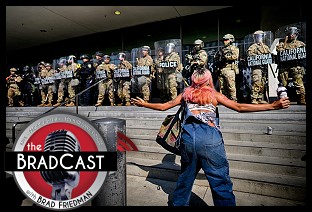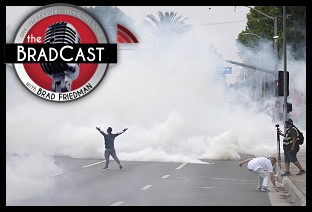 Voting is now officially under way in the 2018 midterm general elections, as Early Voting finally began on Friday in Minnesota and South Dakota and, very shortly, in at least half a dozen other states around the country in advance of Election Day on November 6th. Voting, however, will not be nearly as simple and verifiable for voters in Georgia, as we discuss in some detail on today's BradCast. [Audio link to complete show is posted below.]
Voting is now officially under way in the 2018 midterm general elections, as Early Voting finally began on Friday in Minnesota and South Dakota and, very shortly, in at least half a dozen other states around the country in advance of Election Day on November 6th. Voting, however, will not be nearly as simple and verifiable for voters in Georgia, as we discuss in some detail on today's BradCast. [Audio link to complete show is posted below.]
Meanwhile, as media continue to focus on the extraordinary allegation of sexual assault against U.S. Supreme Court nominee Brett Kavanaugh (and Trump's new response to them), as made by Palo Alto University psychology professor Christine Blasey Ford, and whether or not she will appear to give testimony about it to the U.S. Senate Judiciary Committee next week, the continuing danger and toxic fallout from Hurricane Florence continues in both North and South Carolina a full week after the storm first made landfall. An urgent warning Thursday from Duke Energy about the imminent rupture of a giant holding pond reservoir where toxic coal ash waste is stored became a reality on Friday. At the same time, the human death toll from the storm rose to at least 42, with new evacuations called for in South Carolina on Friday due to still-rising rivers as thousands remained dislocated or without power in North Carolina.
Next, we move to the shameful situation in Georgia, just weeks out from the crucial midterm elections, where Sec. of State Brian Kemp --- the Trump-endorsed Republican who is running for Governor this year against Democratic nominee Stacey Abrams --- is allowing inaccurate voter registration forms, falsely instructing first-time voters that they must mail in proof of residence when registering, to be used across the state.
Even more disturbing is the fact that Peach State voters will be forced, once again, to vote on 100% unverifiable touchscreen voting systems on Election Day, despite a U.S. District Court Judge finding them this week to be "unverifiable" and featuring "serious vulnerabilities" which are "not just a theoretical, paranoid notion at this point," as defendants in the case, including Kemp, had argued in court. Nonetheless, in response to a motion filed by plaintiffs seeking to force the state to allow Election Day voters to use the same hand-marked paper ballots used for absentee voting for years across the state, Judge Amy Totenberg is allowing GA's unsecurable and unverifiable 16-year old Diebold touchscreen voting machines to be used yet again this November. In her ruling [PDF], she cites defendants' claims of "chaos" and forced poll closures they threatened would ensue if hand-marked paper ballots were ordered for use at polling places this year.
We're joined today by longtime Election Integrity advocate and one of the plaintiffs in the GA case, MARILYN MARKS of the Coalition for Good Governance, to discuss this week's ruling and Kemp's disingenuous defense of his indefensible voting systems.
"The defendants put the judge in a very difficult place because they essentially threatened that they would sabotage the election. They didn't really use those words, but they said, 'We're going to shut down early voting locations in Fulton County'. Fulton County [Atlanta] has 21 early voting locations. They said 'We'll go down to three'. In their briefing, they said they'd go down to one. They also said they may close Election Day polling places if she were to require them to go to a paper ballot," Marks tells me. "And so the vast majority of Georgia's voters are going to vote on what the judge has basically said is going to be an unconstitutional system."
"The court was already very well aware of the science, and she was quite aware of the lack of any effort, and lack of any science, and lack of any expert testimony put on by the defendants. So I think that her decision didn't rest on the science. It was this whole threat of chaos."
Moreover, she says, the state has also falsely claimed that counties were required to use the unverifiable touchscreen systems. "The state not only had been saying it was required by state law, but they had threatened the counties who began to recognize it wasn't required by state law, and that the counties, local authorities, have the ability, on their own, to go to paper ballots. The Secretary of State has been threatening them, telling them 'No, you do not have that authority.' They even told the press that they would punish counties that went to paper ballots."
While Marks, who is a Republican herself, reports the multi-partisan plaintiffs are justifiably disappointed in the court's ruling for the short term, she also details several key findings from the ruling which will be important to the continuing efforts both in this case and other federal challenges like it around the country. Among the favorable finding are that plaintiffs do, in fact, have Constitutional standing to challenge such voting systems in federal court, and that "further delay", according to Judge Totenberg, in moving the state to a verifiable voting system after this year's elections, is "not tolerable".
"The important thing here," Marks explains, is that the judge "said that we were likely to prevail on the merits as we move forward in this case, and our claims are related to constitutional claims. And that is what the scholars, the lawyers, the election advocates across the country are recognizing as such a very important finding in the ruling she has made here. That we are likely to prevail in our argument that this is an unconstitutional system, when the voters cannot rely on an auditable, verifiable system."
Marks also explains one moment from the hearing where she said she thought later: "Man, I'm glad Brad isn't here to hear this, or his head would have exploded." My head subsequently explodes when she relays the story and for much of the rest of my interview today.
While Abrams, Kemp's African-American opponent in the Gubernatorial election, is calling for voters to cast hand-marked paper absentee ballots this year to increase the likelihood of them being accurately tallied, Marks explains why she is not certain that is actually a better option for voters in the state. She details the Catch-22 that GA voters are once again facing, not unlike the Catch-22 Judge Totenberg said she found herself in while deciding how to rule on plaintiffs' motion this week.
And again, my head explodes...
(Snail mail support to "Brad Friedman, 7095 Hollywood Blvd., #594 Los Angeles, CA 90028" always welcome too!)
|


 Sunday 'Total Obliteration' Toons
Sunday 'Total Obliteration' Toons Thank You For Your Attention to This Matter:
Thank You For Your Attention to This Matter: 'Green News Report' 6/26/25
'Green News Report' 6/26/25
 Mamdani Primary 'Win' Augurs New Generation of Progressives Rising: 'BradCast' 6/25/25
Mamdani Primary 'Win' Augurs New Generation of Progressives Rising: 'BradCast' 6/25/25 U.S. Authoritarianism Under-way (But We're Still Here to Fight It): 'BradCast' 6/24/25
U.S. Authoritarianism Under-way (But We're Still Here to Fight It): 'BradCast' 6/24/25 'Green News Report' 6/24/25
'Green News Report' 6/24/25 'Anti-War' Trump Attacks a Mid-East Nation on False Claims About WMD: 'BradCast' 6/23/25
'Anti-War' Trump Attacks a Mid-East Nation on False Claims About WMD: 'BradCast' 6/23/25  Sunday 'Peacemaker' Toons
Sunday 'Peacemaker' Toons Senate Health Care Cuts 'More Extreme' Than House Version: 'BradCast' 6/19/25
Senate Health Care Cuts 'More Extreme' Than House Version: 'BradCast' 6/19/25 'Green News Report' 6/19/25
'Green News Report' 6/19/25 What 'Anti-War President'? MAGA Civil War Over Trump, Iran: 'BradCast' 6/18/25
What 'Anti-War President'? MAGA Civil War Over Trump, Iran: 'BradCast' 6/18/25 Trump Calls for 'Remigration', a Codeword for 'Ethnic Cleansing': 'BradCast' 6/17/25
Trump Calls for 'Remigration', a Codeword for 'Ethnic Cleansing': 'BradCast' 6/17/25 'Green News Report' 6/17/25
'Green News Report' 6/17/25 Last Weekend Today: 'BradCast' 6/16/25
Last Weekend Today: 'BradCast' 6/16/25 Sunday 'Despot Times, Despot Measures' Toons
Sunday 'Despot Times, Despot Measures' Toons Then They Came for the U.S. Senators: 'BradCast' 6/12/25
Then They Came for the U.S. Senators: 'BradCast' 6/12/25 'Green News Report' 6/12/25
'Green News Report' 6/12/25 Lawless Trump Warms Up for Insurrection Act: 'BradCast' 6/11/25
Lawless Trump Warms Up for Insurrection Act: 'BradCast' 6/11/25 Trump Inciting Violence, State of Fear in L.A., Elsewhere: 'BradCast' 6/10/25
Trump Inciting Violence, State of Fear in L.A., Elsewhere: 'BradCast' 6/10/25 Nevermind Elon and Epstein Files, Trump Declares L.A. 'Riots'!: 'BradCast' 6/9/25
Nevermind Elon and Epstein Files, Trump Declares L.A. 'Riots'!: 'BradCast' 6/9/25 'Jesus Weeps' at Trump's
'Jesus Weeps' at Trump's 300k 'Preventable' Deaths Since Trump USAID Shutdown: 'BradCast' 6/4/25
300k 'Preventable' Deaths Since Trump USAID Shutdown: 'BradCast' 6/4/25 Storm Warnings: 'BradCast' 6/3/25
Storm Warnings: 'BradCast' 6/3/25 SCOTUS Ignores Own Precedents In Recent 'Emergency' Rulings: 'BradCast' 6/2/25
SCOTUS Ignores Own Precedents In Recent 'Emergency' Rulings: 'BradCast' 6/2/25 'A World of Tyrants, Bribes, and Influence': 'BradCast' 5/22/25
'A World of Tyrants, Bribes, and Influence': 'BradCast' 5/22/25
 VA GOP VOTER REG FRAUDSTER OFF HOOK
VA GOP VOTER REG FRAUDSTER OFF HOOK Criminal GOP Voter Registration Fraud Probe Expanding in VA
Criminal GOP Voter Registration Fraud Probe Expanding in VA DOJ PROBE SOUGHT AFTER VA ARREST
DOJ PROBE SOUGHT AFTER VA ARREST Arrest in VA: GOP Voter Reg Scandal Widens
Arrest in VA: GOP Voter Reg Scandal Widens ALL TOGETHER: ROVE, SPROUL, KOCHS, RNC
ALL TOGETHER: ROVE, SPROUL, KOCHS, RNC LATimes: RNC's 'Fired' Sproul Working for Repubs in 'as Many as 30 States'
LATimes: RNC's 'Fired' Sproul Working for Repubs in 'as Many as 30 States' 'Fired' Sproul Group 'Cloned', Still Working for Republicans in At Least 10 States
'Fired' Sproul Group 'Cloned', Still Working for Republicans in At Least 10 States FINALLY: FOX ON GOP REG FRAUD SCANDAL
FINALLY: FOX ON GOP REG FRAUD SCANDAL COLORADO FOLLOWS FLORIDA WITH GOP CRIMINAL INVESTIGATION
COLORADO FOLLOWS FLORIDA WITH GOP CRIMINAL INVESTIGATION CRIMINAL PROBE LAUNCHED INTO GOP VOTER REGISTRATION FRAUD SCANDAL IN FL
CRIMINAL PROBE LAUNCHED INTO GOP VOTER REGISTRATION FRAUD SCANDAL IN FL Brad Breaks PA Photo ID & GOP Registration Fraud Scandal News on Hartmann TV
Brad Breaks PA Photo ID & GOP Registration Fraud Scandal News on Hartmann TV  CAUGHT ON TAPE: COORDINATED NATIONWIDE GOP VOTER REG SCAM
CAUGHT ON TAPE: COORDINATED NATIONWIDE GOP VOTER REG SCAM CRIMINAL ELECTION FRAUD COMPLAINT FILED AGAINST GOP 'FRAUD' FIRM
CRIMINAL ELECTION FRAUD COMPLAINT FILED AGAINST GOP 'FRAUD' FIRM RICK SCOTT GETS ROLLED IN GOP REGISTRATION FRAUD SCANDAL
RICK SCOTT GETS ROLLED IN GOP REGISTRATION FRAUD SCANDAL VIDEO: Brad Breaks GOP Reg Fraud Scandal on Hartmann TV
VIDEO: Brad Breaks GOP Reg Fraud Scandal on Hartmann TV RNC FIRES NATIONAL VOTER REGISTRATION FIRM FOR FRAUD
RNC FIRES NATIONAL VOTER REGISTRATION FIRM FOR FRAUD EXCLUSIVE: Intvw w/ FL Official Who First Discovered GOP Reg Fraud
EXCLUSIVE: Intvw w/ FL Official Who First Discovered GOP Reg Fraud GOP REGISTRATION FRAUD FOUND IN FL
GOP REGISTRATION FRAUD FOUND IN FL

































